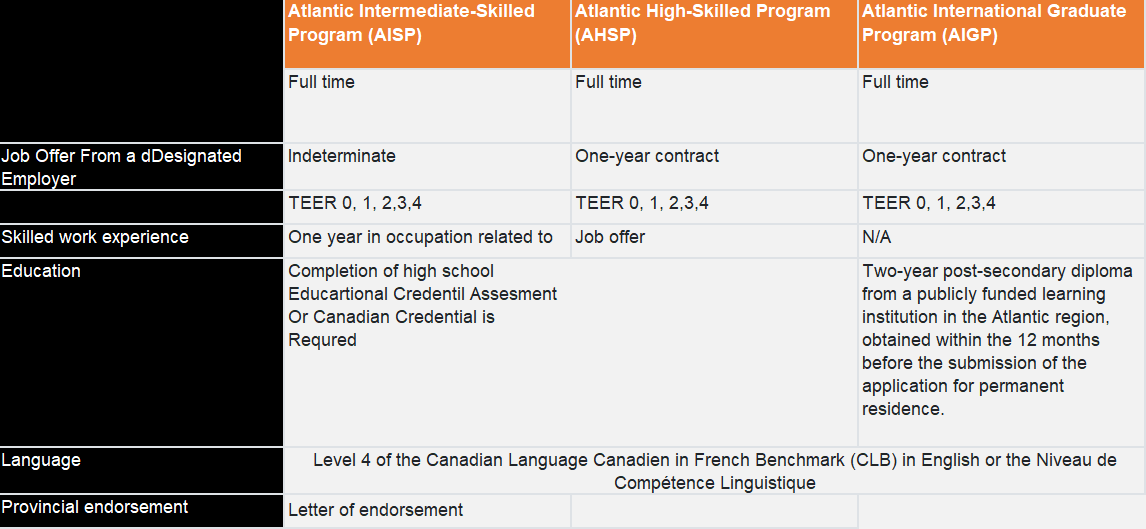


The Atlantic Immigration Pilot is a fast-track immigration program that allows employers in Canada’s four Atlantic provinces — Nova Scotia, New Brunswick, Newfoundland and Labrador and Prince Edward Island — to hire foreign nationals for jobs they haven’t been able to fill locally.
Introduced in 2017, the federal government and its provincial government partners aim to welcome more than 7,000 newcomers and their families to the Atlantic Canada region by 2021 through the Atlantic Immigration Pilot Program.
The Atlantic Immigration Pilot is designed to welcome additional newcomers to the Atlantic Canada region to fill the needs of local employers and communities.
The three-year pilot program allows designated local employers to identify, recruit and retain global talent. The program also has the goals of supporting population growth, developing a skilled workforce, and increasing employment rates in the region.
The pilot program forms part of an overall Atlantic Growth Strategy that is focused on the following five priority areas:
The Atlantic Immigration Pilot is an employer-driven program that facilitates the hiring of foreign workers. All principal applicants arriving in Canada under the pilot program must have a job offer from a designated employer and an individualized settlement plan for themselves and their family.
Once a designated employer finds a candidate who meets their employment needs and the program criteria, that employer will need to first offer them a job. Employers do not need to go through the process of obtaining a Labour Market Impact Assessment (LMIA) under this program.
Once the candidate has accepted the job, the employer will connect the candidate with a designated settlement service provider organization for a needs assessment and to develop a settlement plan. Employers will also support the long-term integration of the new immigrant and his or her family, if applicable, so they can reach the goals of their settlement plan once they arrive in Canada.
Employers that need to fill a job vacancy quickly will have access to a temporary work permit, so that the candidate and his or her family can come to Canada as soon as possible. In order to obtain this work permit, candidates will need:
Employer designation
Employers that would like to hire skilled immigrants under the pilot program must apply to the province(s) in order to receive designation. Employers with locations in multiple provinces will require a separate designation for each province. Employers must meet certain requirements, including a commitment to support the newcomer and his or her family as they integrate into their new life in Atlantic Canada.
The Atlantic Immigration Pilot Program has two programs for skilled workers:
and one program for international student graduates:
The work experience, education, and job offer required will depend on whether the individual is applying as a worker or as an international student graduate. The other requirements are the same for both.
Other ways to immigrate to Atlantic Canada
The Atlantic provinces have already been active in immigration over recent years, principally through the Provincial Nominee Programs (PNPs). Through these programs, the provinces have been able to welcome a wide range of skilled workers, graduates who have studied in Canada, and business immigrants such as entrepreneurs. Since 2015, each Atlantic province has created at least one PNP stream aligned with the federal Express Entry system, allowing candidates in the Express Entry pool who are also eligible to immigrate through one of these streams to submit an application to immigrate to the given province.
Currently, the Atlantic PNP options include:
See the table below for a review of the requirements.

Asses the correct PNP option
as per your eligibility based on the following:
Age
Job Offer
National Occupation Code
Skills
Education
Language Abilities
Adaptability
You can choose to apply for over 95 PNP programs across Canada from the following provinces:
New Brunswick
Newfoundland and Labrador
Nova Scotia
Prince Edward Island
You might need to apply
using the paper-based process,
or by the online process as directed as part of the process.
You will have to pass a mandatory
medical exam and acquire a police clearance certificate / police background check.
If nominated, you will receive an
expression of interest from the province and will be asked to apply for federal application for PR.
To become a permanent resident, you must either present your PR visa at a port of entry (POE) to Canada or
If your are in Canada with a valid status, request an appointment at a local IRCC.
A permanent resident visa holder in the PN class seeking PR status at a POE must establish that they still intend to reside in the province or territory that has nominated them.





151 Great George Street,
Suite 205,
Charlottetown,
PE – C1A 4K8,
Canada
+1 289-500-7789
info@maplecrestimmigration.com
105 Bayside Road,
Summerside,
PE – C1N 4J9,
Canada